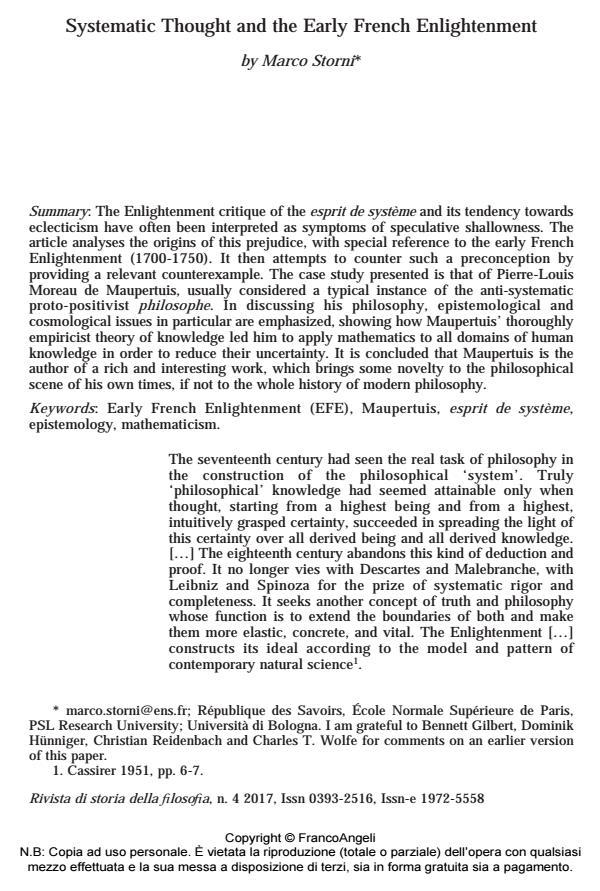Systematic Thought and the Early French Enlightenment
Journal title RIVISTA DI STORIA DELLA FILOSOFIA
Author/s Marco Storni
Publishing Year 2017 Issue 2017/4
Language English Pages 12 P. 629-640 File size 47 KB
DOI 10.3280/SF2017-004008
DOI is like a bar code for intellectual property: to have more infomation
click here
Below, you can see the article first page
If you want to buy this article in PDF format, you can do it, following the instructions to buy download credits

FrancoAngeli is member of Publishers International Linking Association, Inc (PILA), a not-for-profit association which run the CrossRef service enabling links to and from online scholarly content.
The Enlightenment critique of the esprit de système and its tendency towards eclecticism have often been interpreted as symptoms of speculative shallowness. The article analyses the origins of this prejudice, with special reference to the early French Enlightenment (1700-1750). It then attempts to counter such a preconception by providing a relevant counterexample. The case study presented is that of Pierre-Louis Moreau de Maupertuis, usually considered a typical instance of the anti-systematic proto-positivist philosophe. In discussing his philosophy, epistemological and cosmological issues in particular are emphasized, showing how Maupertuis’ thoroughly empiricist theory of knowledge led him to apply mathematics to all domains of human knowledge in order to reduce their uncertainty. It is concluded that Maupertuis is the author of a rich and interesting work, which brings some novelty to the philosophical scene of his own times, if not to the whole history of modern philosophy.
Keywords: Early French Enlightenment (EFE), Maupertuis, esprit de système, epistemology, mathematicism.
- Ancillon 1815: Frédéric Ancillon, Éloge de Jean Bernard Mérian, secrétaire perpétuel de l’Académie in Abhandlungen des Königlichen Akademie des Wissenschaften in Berlin, aus den Jahren 1804-1811, Realschul-Buchhandlung, Berlin 1815, pp. 52-90.
- Beeson 1987: David Beeson, Maupertuis at the Crossroads: Dating the Réflexions philosophiques, 249, 1987, pp. 241-250.
- Beeson 1992: Id., Maupertuis: An Intellectual Biography, The Voltaire Foundation, Oxford 1992.
- Brown 1963: Harcourt Brown, Maupertuis philosophe: Enlightenment and the Berlin Academy in Theodore Besterman (ed.), Transactions of the First International Congress on the Enlightenment, Institut et musée Voltaire, Geneva 1963, pp. 255-269.
- Cassirer 1951: Ernst Cassirer, The Philosophy of the Enlightenment, trans. Fritz C.A. Koelln and James P. Pettegrove, Princeton University Press, Princeton 1951.
- Condillac 1982: Étienne Bonnot de Condillac, Philosophical Writings of Étienne Bonnot, Abbé de Condillac, vol. 1, trans. Franklin Philip, Lawrence Erlbaum, Hillsdale (NJ) 1982.
- D’Alembert 1995: Jean Le Rond D’Alembert, Preliminary Discourse to the Encyclopedia of Diderot, trans. Richard N. Schwab, University of Chicago Press, Chicago 1995.
- De Puisieux 1750: Madeleine De Puisieux, Les caractères, London 1750.
- Gay 1959: Peter Gay, The Party of Humanity, Princeton University Press, Princeton 1959.
- Gilbert 2014: Bennett Bruce Gilbert, Some Neglected Aspects of the Rococo: Berkeley, Vico, and Rococo Style, M.A. dissertation, Portland State University (OR).
- Leduc 2015: Christian Leduc, La métaphysique de la nature à l’Académie de Berlin, 42, 1, 2015, pp. 11-30.
- Leduc 2016: Id., Maupertuis entre moindre action et force vive in Herbert Breger, Jürgen Herbst and Sven Erdner (ed.), Ad felicitam nostram alienamque, Leibniz Gesellschaft, Hannover 2016 (forthcoming).
- Lyssy 2015: Ansgar Lyssy, L’économie de la nature – Maupertuis et Euler sur le principe de moindre action, 42, 1, 2015, pp. 31-51.
- Maupertuis 1768a: Pierre-Louis Moreau de Maupertuis, Œuvres, vol. 1, Bruyset, Lyon 1768.
- Maupertuis 1768b: Id., Œuvres, vol. 2, Bruyset, Lyon 1768.
- Maupertuis 1768c: Id., Œuvres, vol. 3, Bruyset, Lyon 1768.
- Müller-Wille 2013: Staffan Müller-Wille, Systems and How Linnaeus Looked at Them in Retrospect, 70, 3, 2013, pp. 305-317.
- Schmidt 2003: James Schmidt, Inventing the Enlightenment: Anti-Jacobins, British Hegelians, and the Oxford English Dictionary, 64, 3, 2003, pp. 421-443.
- Terrall 2002: Mary Terrall, The Man Who Flattened the Earth: Maupertuis and the Sciences in the Enlightenment, The University of Chicago Press, Chicago-London 2002.
- Tonelli 1987: Giorgio Tonelli, La pensée philosophique de Maupertuis: son milieu et ses sources, Georg Olms, Hildesheim-New York 1987.
- Voltaire 2007: Voltaire, Philosophical Letters, or Letters Regarding the English Nation, ed. John Leigh, trans. Prudence L. Steiner, Hackett, Indianapolis-Cambridge 2007.
Marco Storni, Systematic Thought and the Early French Enlightenment in "RIVISTA DI STORIA DELLA FILOSOFIA" 4/2017, pp 629-640, DOI: 10.3280/SF2017-004008